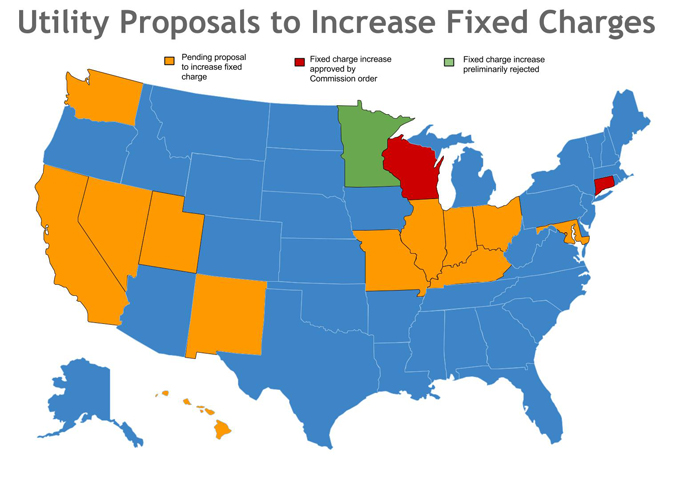Facing resistance in their efforts to impose monthly charges on rooftop solar customers,[1] utilities have adopted a new strategy to discourage customers from going solar and preserve their profits in the face of flattening electricity demand. The new strategy, handed down by the Edison Electric Institute,[2] is to increase the fixed monthly charge on the bills of all residential customers, thereby making a smaller portion of that bill vary with the customer’s electricity use. When customers can avoid less of their bill through energy efficiency or installing rooftop solar, their incentive to make those investments is substantially reduced. By analogy, if automobile drivers had to pay $250 a month for the privilege of filling up at gas stations, but paid 50% less for each gallon of gas, you’d expect a lot less effort to carpool, purchase fuel efficient cars, and maybe even increased vehicle miles traveled.
High fixed charges are also regressive. Bills for low-use customers will go up, while the bills for high-use customers will go down. An analysis by John Howat of the National Consumer Law Center[3] shows that nationwide, households classified as low-income or headed by non-Caucasians and adults over 65 consistently use less electricity than the average:
- Low-income households (defined as below 150% of poverty) consumed 14% less electricity on average than non-low income households
- Elder households (65 or older) consumed 16% less electricity than non-elder households
- Households headed by an individual of African-American descent consumed on average 13% less electricity than Caucasian-headed households, while households headed by Latinos consumed nearly 17% less than non-Latino households
Flood of Fixed Charge Increases
Proposals to increase fixed charges have been filed in over a dozen states, as shown in the map below, and new cases are being filed every month. Some of these proposals would more than double the fixed cost, which is typically less than $10 per month. For example, the Wisconsin Public Service Commission recently approved increases in the fixed charges for three Wisconsin investor-owned utilities: We Energies’ charge increased by 78%, Madison Gas & Electric by 82%, and Wisconsin PSC by 83%.[4]
The Sierra Club is currently fighting proposals to increase fixed charges in rate cases in Kentucky (Louisville Gas & Electric and Kentucky Utilities), Missouri (Kansas City Power & Light), California, and Minnesota.

Utilities love higher fixed charges, which guarantee that the utility’s shareholders will earn profits even if customers purchase less electricity. The utilities’ main argument is that the fixed costs to serve customers should be recovered through fixed charges to avoid intra-class subsidies—specifically having high-consumption customers pay some of the fixed costs for serving low-consumption customers. This simplistic case has several flaws:
- It ignores that very few costs are truly fixed over the medium- to long-term; most can be avoided if peak load growth slows or stops.
- It selectively addresses only one kind of intra-class subsidy, overlooking the very different costs of serving urban and rural customers, for example.
- It elevates cost-of-service over all other principles commonly used to determine whether rates are fair, just, and reasonable. For example, many regulators consider the impact of rate structure on conservation incentives to be an important factor in setting rates, as well as fairness to low-income, low-use customers. Other public policy principles are important, not just the utility’s desire for a fixed charge that perfectly reflects fixed costs.
Minnesota Rejects Fixed Charge Increase
The Sierra Club and other clean energy groups, including Minnesota Center for Environmental Advocacy, Fresh Energy, NRDC, and the Izaak Walton League—Midwest Office, recently challenged the request by Xcel Energy to increase the customer charge on its Minnesota residential customers by $1.25. At the end of December, an administrative law judge rejected that request, finding that the increased charge would impede conservation and harm low-income customers. She also found flaws in the underlying cost of service study and how Xcel had interpreted that study in making its fixed charge proposal.[5]
The Sierra Club will continue to resist utility efforts to increase fixed charges, making sure that regulators and consumers are fully informed about how these proposals undercut efficiency and distributed generation incentives, undermine utility efforts to increase participation in their demand-side management programs, and harm low-income customers.
[1] For example, the Utah Public Service Commission recently rejected the request of PacifiCorp to impose such a fee on residential net metering customers. See Report and Order (Aug. 29, 2014), Docket No.13-035-184, at http://www.psc.utah.gov/utilities/electric/elecindx/2013/documents/26006513035184rao.pdf.
[2] Edison Electric Institute, Disruptive Challenges: Financial Implications and Strategic Responses to a Changing Retail Electric Business (Jan. 2013), at http://www.eei.org/ourissues/finance/documents/disruptivechallenges.pdf.
[3] See Public Comment Of John Howat, National Consumer Law Center On Behalf Of Wisconsin Community Action Program Association Regarding The Madison Gas And Electric Company Proposal To Increase Fixed, Monthly Residential Customer Charges From $10.50 Per Month To $19.00 Per Month (Oct. 8, 2014), available at http://www.psc.wi.gov/apps35/ERF_view/viewdoc.aspx?docid=221799.
[4]See Kari Lydersen, On utilities and solar, Wisconsin goes its own way, Midwest Energy News (Dec. 3, 2014), at http://www.midwestenergynews.com/2014/12/03/on-utilities-and-solar-wisconsin-goes-its-own-way/
[5] See ALJ Order issued December 26, 2015, in GR13-868. Sierra Club worked with the Minnesota Center for Environmental Advocacy, Fresh Energy, NRDC, and the Izaak Walton League—Midwest Office.